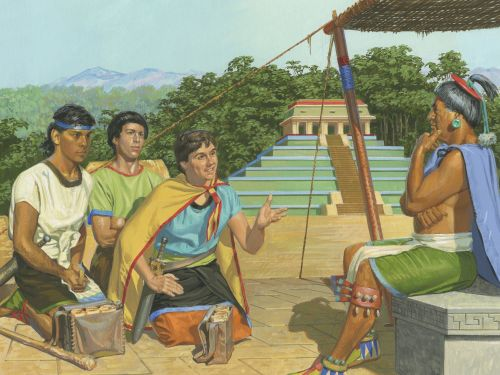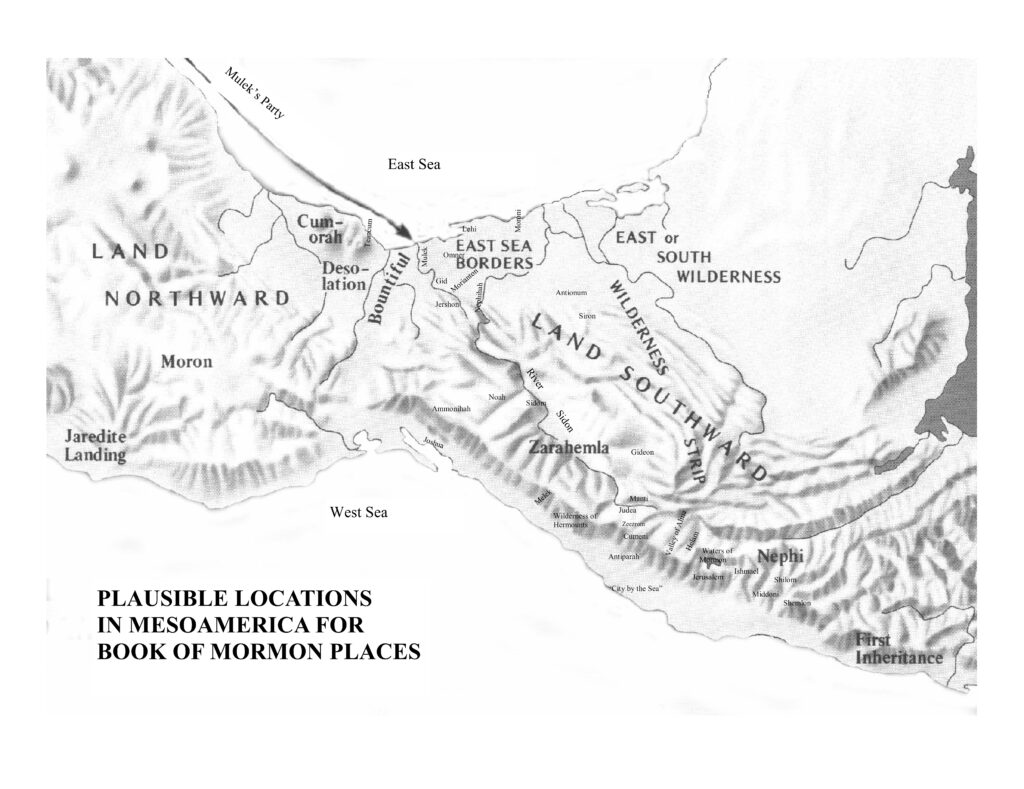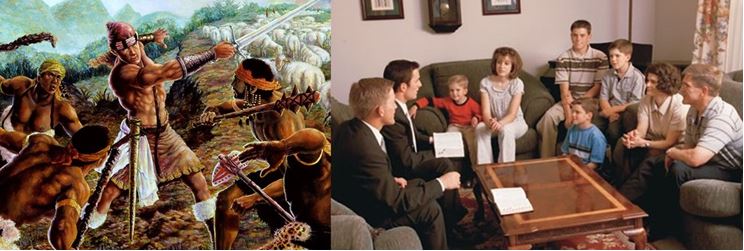To accompany your Come Follow Me study for July 1-7
In addition to reading these chapters from Alma, you will enjoy watching the following videos:
You will also enjoy looking at the following related material from the Book of Mormon Institute Student Manual:
If you would like a Kahoot game related to this material which you could use for personal study or use with your family or your class, click here: https://create.kahoot.it/share/alma-17-22/02a0f2b9-8dd6-46e5-994b-08a760f3004d. To use it with a group, after clicking on this link, you will need to log into Kahoot, creating a free account if you have not done so previously, then click on the blue “Start” button. Some of the Kahoot questions may presuppose that the player has read through the suggested answers to the following Points to Ponder and at least has browsed the Institute student manual as well.
Points to Ponder in Alma 17-22
1. Compare and contrast the missions of the four sons of Mosiah with those of Latter-day Saint missionaries today from the following standpoints:
| Sons of Mosiah | Today’s missionaries | |
| How the missionary call came | ||
| Preparations for the mission | ||
| What the missionaries took with them | ||
| Missionary techniques | ||
| Duration of the mission | ||
| Obstacles faced and sacrifices made | ||
| Divine assistance received | ||
| Results obtained |
2. (18:5) If Lamoni believed that whatever he did was right, why did he worry about whether he had done wrong in killing his servants?

3. (18:35) How complete a summary is this verse of the possible effects of the Holy Ghost on a person?
4. (20:17; Moroni 8:14) How important is it to die happy rather than angry? Is it true that one’s spiritual condition or even mood at the very moment of death largely determines one’s condition in the next life?

5. The Lamanite king (Lamoni’s father) offered to give up several things in order to obtain the joy Aaron promised him was possible. Which offer do you think was most impressive to the Lord? What in fact did the king actually have to give up? What are you required to give up in order to be a faithful Latter‑day Saint?

6. Of what use is all of the geographical information we are given at the end of Alma 22?

7. How do we explain the assertion in Alma 18:12 that “Ammon had made ready the horses and the chariots for the king and his servants,” in view of the fact that critics say that there were no horses in ancient America prior to the arrival of Columbus and that ancient Americans did not have wheeled vehicles?
8. Why are people so often exhausted to the point of evident unconsciousness by powerful spiritual experiences in the Book of Mormon? Is there evidence for anything similar outside of that book?

Possible Answers to Points to Ponder in Alma 17-22
1. Compare and contrast the missions of the four sons of Mosiah with those of Latter-day Saint missionaries today from the following standpoints:
| Sons of Mosiah | Today’s missionaries | |
| How the missionary call came | Mos. 28:1: Volunteered and chose area and companions Mos. 28:5: Sought permission of father (prophet) Mos. 28:6: Mosiah inquired of the Lord Mos. 28:7: Mosiah received revelation and promise | One volunteers (or is encouraged by priesthood leaders), submits an application to the First Presidency, and receives a call from the Prophet to a specific area. Companions and specific areas are assigned by the mission president. |
| Preparations for the mission | Alma 17:2: Searched scriptures 17:3, 9: fasted and prayed 17:18: were blessed by Ammon, who also conducted a mini-MTC! | Ideally seminary and institute, MTC, financial preparations; worthiness preparations; language study |
| What they took with them | 17:7: Swords, spears, bows, arrows, slings | Clothes, suitcases, scriptures, cash |
| Missionary techniques | 17:9, 11; 22:1, 4: Prayed and got revelation 17:11: Good examples 17:13: Separated 17:23, 29: Warmed up Lamoni first! Looked for opportunity to serve and impress; see also 20:21-23 & 22:3. 18:16: Starts with subject of interest; reads mind 18:25-26: Explains; starts at Lamoni’s level; doesn’t try to “prove.” See also 21:9 & 22:7-12. 18:22-23: wise yet harmless; good guile 18:24: boldness 18:36: teaches thoroughly 20:2: receives direction on where to go 21:9: Taught from scriptures. Also 22:12-13. 21:11: Left when it was clear he wasn’t wanted 21:11: “contended”—that is, they earnestly tried to explain the gospel and convince their hearers of its truthfulness 21:4, 16: preached in synagogues and assemblies. Also 23:4. 19:21 & 22:23: Let new converts teach others! | Most of the same techniques should be used, but missionaries today always have an assigned companion and do not split up, as did the sons of Mosiah. In addition, today’s missionaries follow the instructions in Preach My Gospel and teach specified principles in an organized fashion. They also have many audio-visual tools and other technology that the sons of Mosiah could only have dreamed of. |
| Duration of mission | 14 years | 2 years for elders, 1 ½ for young women |
| Obstacles faced and sacrifices made | 17:14: teaching a wild, hardened, idle, idolatrous, and ferocious people, who delighted in murder and plunder (equivalent of going to North Korea!). 17:20: bound 20:16: life threatened by king 20:29: Aaron and brethren in prison many days; naked, skin worn, hunger, thirst, afflictions 20:30: cast out, smitten, driven from house to house 21:5: hecklers 21:10: mocked by those who refused to hear | Leave family and friends. Postpone education and career. Rejection and ridicule, though usually little physical persecution. Significant financial cost. |
| Divine assistance received | Alma 13:22-24: angels prepared the way Alma 17:3: Had power to teach with authority Alma 17:10: Comfort Alma 17:35; 19:22: Physical protection Alma 18:16: Ability to discern thoughts Alma 19:8: Ability to prophesy Alma 19: 13, 33-34: Revelation to investigators Alma 20:2; 21:16; 22:1: Revelation about where to go. Alma 22:18, 22: Falling into evident unconsciousness; being brought back | The same blessings are available today, depending on the worthiness and preparation of the missionary and the need for such divine intervention. |
| Results obtained | Alma 17:40; 19:14: King was converted and felt overwhelming joy. Alma 19:31-35; 21:17: Many others believed. 21:21; 22:27: Liberty was established and missionaries were protected by a royal proclamation. Alma 23:6: Perfect retention | Numbers of converts are usually fewer, but they experience the same change of heart and the same joy as the converted Lamanites. |
2. (18:5) If Lamoni believed that whatever he did was right, why did he worry about whether he had done wrong in killing his servants?
All normal human beings are endowed with a conscience which tells them certain things are right and wrong, regardless of what they may have been taught or what they pretend to believe.
3. (18:35) How complete a summary is this verse of the possible effects of the Holy Ghost on a person?
Fairly complete—virtually all of its effects may be summed up as (1) to reveal or testify (give knowledge) or (2) to give power to its recipients to do what they otherwise could not do.
4. (20:17; Moroni 8:14) How important is it to die happy rather than angry? Is it true that one’s spiritual condition or even mood at the very moment of death largely determines one’s condition in the next life?
These verses, as well as Alma 34:34, seem to suggest that the spirit one has at the time he leaves this life has power to possess him in the eternal world. No doubt changes can still be made there, but it is evidently more difficult and time-consuming.
5. The Lamanite king (Lamoni’s father) offered to give up several things in order to obtain the joy Aaron promised him was possible. Which offer do you think was most impressive to the Lord? What in fact did the king actually have to give up? What are you required to give up in order to be a faithful Latter‑day Saint?
The king offered to give up all he possessed, even his kingdom, to have the peace and joy Aaron promised. He later promised to give away all his sins. It was the latter that the Lord was looking for, though the king, like we, had to be willing to give up everything else, if necessary. To be a good Latter-day Saint we have to give up sins and practices that some consider enjoyable, but we always get more than we give up as a result.
6. Of what use is all of the geographical information we are given at the end of Alma 22?
1. It helps us enjoy the story of the Book of Mormon more if we can have a mental image of where things were happening. 2. The internal consistency of the Book of Mormon geography, plus the fact that it corresponds to actual places in the Americas, constitute additional evidence for the authenticity of the record.
See also the following article “Why Did Mormon Give So Many Details About Geography?” at https://knowhy.bookofmormoncentral.org/knowhy/why-did-mormon-give-so-many-details-about-geography and the related video at:
7. How do we explain the assertion in Alma 18:12 that “Ammon had made ready the horses and the chariots for the king and his servants,” in view of the fact that critics say that there were no horses in ancient America prior to the arrival of Columbus and that ancient Americans did not have wheeled vehicles?
The chariots were not necessarily wheeled vehicles, and they were not necessarily pulled by the horses. And what the Book of Mormon calls “horses” may well have have been another type of animal, such as a domesticated deer. See the article in Meridian Magazine at https://latterdaysaintmag.com/article-1-1638/ entitled “Horses and Chariots.” See also the article “What is the Nature and Use of Chariots in the Book of Mormon” at https://knowhy.bookofmormoncentral.org/knowhy/what-is-the-nature-and-use-of-chariots-in-the-book-of-mormon and the related videos at:
8. Why are people so often exhausted to the point of evident unconsciousness by powerful spiritual experiences in the Book of Mormon? Is there evidence for anything similar outside of that book?
See the article at https://knowhy.bookofmormoncentral.org/knowhy/why-are-people-exhausted-by-powerful-spiritual-experiences and the related video at:
